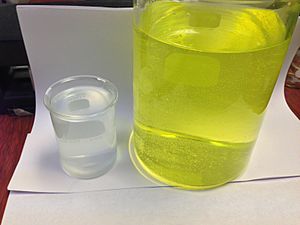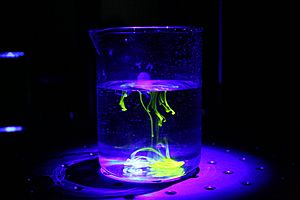Riboflavin facts for kids
Riboflavin is a very important vitamin that your body needs to stay healthy. It's also known as vitamin B2. Riboflavin is one of the vitamins that can dissolve in water. This means your body doesn't store it for a long time. Instead, any extra riboflavin usually leaves your body when you go to the bathroom.
Your gut (which is your stomach and intestines) is really good at taking riboflavin from the food you eat. It then sends it into your blood so your body can use it. All the B vitamins, including riboflavin, help your body turn food into energy. Without enough riboflavin, your body can't properly use fats, carbohydrates, and proteins from your meals.
Many common foods have a lot of riboflavin. These are called "good sources" of vitamin B2:
- Milk
- cheese
- Green, leafy vegetables like spinach
- liver
- beans, peas, and soybeans
- yeast
- almonds
- Asparagus
- Bananas
- okra
- chard
- cottage cheese
- yogurt
- meat
- Eggs
- Fish
It's interesting to know that Light can break down riboflavin. This means that riboflavin in food can be damaged if it's left in bright light for too long.
If you eat too much riboflavin, your gut usually won't absorb enough to make you sick. However, getting too much through an injection could make someone unwell. Your kidneys help remove extra riboflavin from your body through your urine. If you have a lot of riboflavin in your body, your urine might turn a bright, glowing yellow color. This often happens after taking vitamin pills or eating foods like liver or egg whites, which are very rich in riboflavin.
To make vitamin B2 for pills or to add to foods, companies grow special yeasts, other fungi, or bacteria. These tiny living things naturally produce a lot of riboflavin.
Riboflavin is naturally yellow or orange-yellow. Because of its color, it can be used as a food coloring in some products. If you shine a blacklight on riboflavin, it glows a bright green!
Sometimes, people can get sick if their food doesn't have enough riboflavin. This is called a "deficiency." Adding extra riboflavin to their diet can help prevent these sicknesses. To make sure people get enough, riboflavin is often added to foods like baby foods, breakfast cereals, pasta, sauces, fruit drinks, and dairy products like cheese. When riboflavin is added to food, it's called "fortification." A lot of the riboflavin that is made is used in vitamin pills.
What Happens If You Don't Get Enough Riboflavin?
When there isn't enough riboflavin in someone's food, it's called a "primary riboflavin deficiency." Sometimes, people have problems with their guts that make it hard for their bodies to absorb riboflavin, even if they eat enough. This is called a "secondary riboflavin deficiency."
Not getting enough riboflavin can cause several problems. People might get sores in their mouth, cracked red lips, or cracks at the corners of their mouth. Their throat might also feel sore. Their eyes could become watery and sensitive to bright light, making it hard to open them in strong daylight. A lack of riboflavin can also lead to dry, scaly skin that cracks easily, and itchy, painful private areas.
In animals, a severe riboflavin deficiency can stop them from growing well and make them very unhealthy. They might even die. For example, dogs with a bad riboflavin deficiency can have sore skin, lose their hair, and their eyes might become cloudy. They can become very weak and have trouble moving or standing. While we don't often see such severe problems in people in rich countries, millions of people might still not get enough riboflavin. They might have "sub-clinical" symptoms, which means they aren't sick enough to go to the hospital, but they still feel unhealthy. Children might not grow as well as they should.
Older people, those who can't eat properly, or people with certain health problems like AIDS, inflammatory bowel disease, diabetes, or heart disease might also have a mild riboflavin deficiency. It takes a while for a riboflavin deficiency to cause serious illness because your body doesn't lose all its riboflavin very quickly.
Images for kids
See also
 In Spanish: Vitamina B2 para niños
In Spanish: Vitamina B2 para niños
 | John T. Biggers |
 | Thomas Blackshear |
 | Mark Bradford |
 | Beverly Buchanan |




